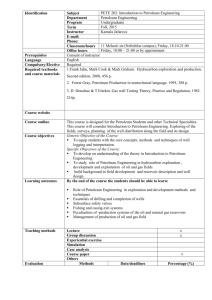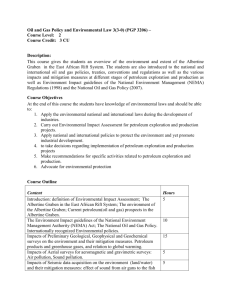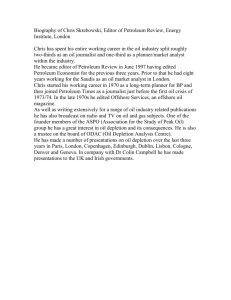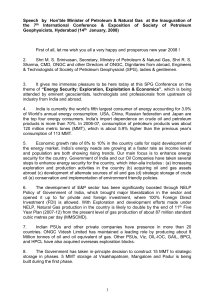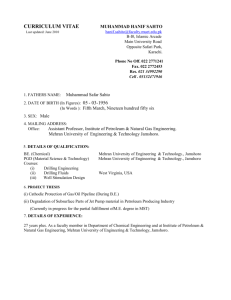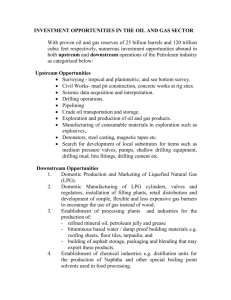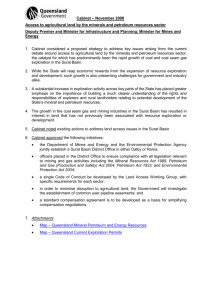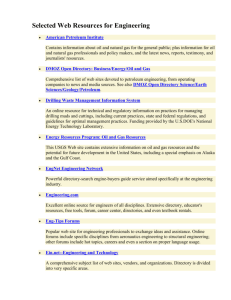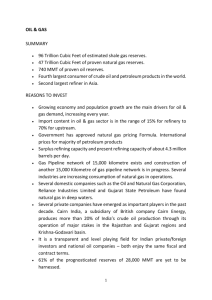CERTIFICATE IN PETROLEUM ACCOUNTING
advertisement
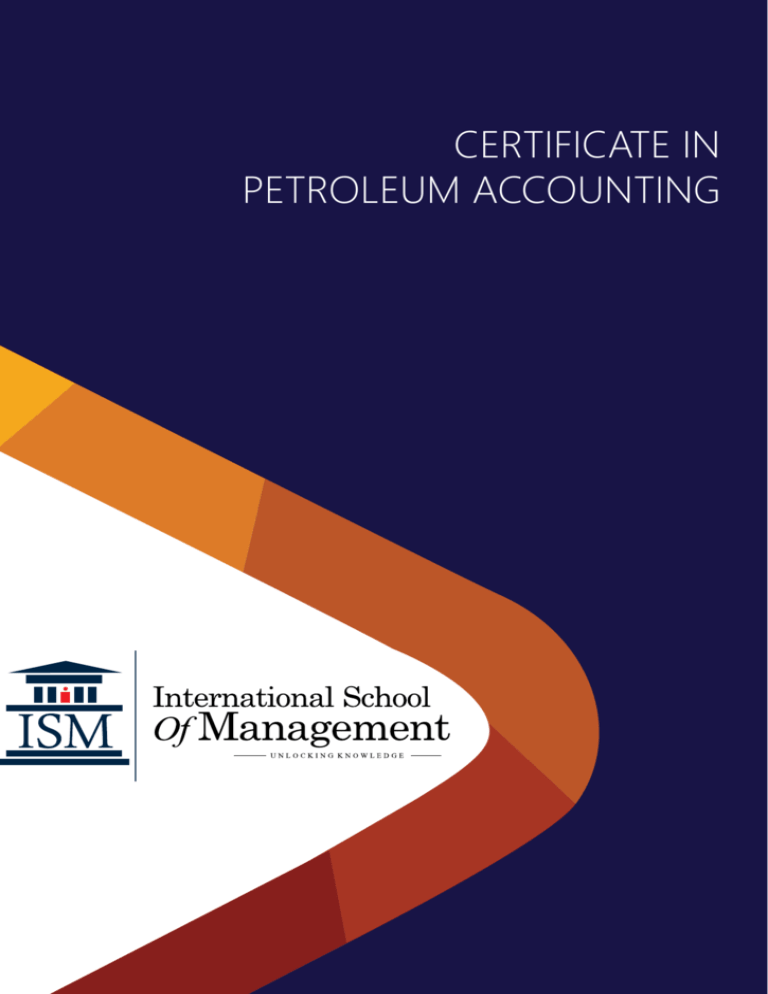
CERTIFICATE IN PETROLEUM ACCOUNTING INTRODUCTION Global oil prices have fallen sharply over a long term period, thereby leading to significant shortfalls in revenues of many of the energy exporting nations while petroleum companies grapple with the financial accounting and profitability implications of the shock. Notwithstanding, the oil industry remains one of the most strategic of all the industries all over the world. Oil is still both a major source of revenue and a visible weapon in international politics. It is therefore very pertinent to adopt a very systemic and sound method of appropriating the proceeds of such an invaluable means of economic and political relevance. Accounting for oil and gas prospecting has developed over the years but there is still no set of globally or generally applied standards of accounting for oil and gas activities. Some oil companies in Nigeria use the successful method while others prefer the full cost method of accounting. However, there is yet another accounting method, which is based on proved oil and gas reserves, this method of Reserve Recognition Accounting is hardly used in the country. Oil and Gas accounting can therefore be quite complex with different entities faced with choosing between Full Cost and Successful Efforts while special rules are applied to depletion, depreciation and amortization. The fact that some of the companies operating in Nigeria are from different countries may also mean the use of varying accounting principles and procedures for recording and reporting in accordance with those practiced in the respective companies’ home country. This practice makes comparability of financial statements of oil companies difficult. Particularly in Nigeria, the adoption of the International Financial Reporting Standard (IFRS) should have a big impact on all upstream oil and gas companies. This course provides participants with an in-depth understanding of the different accounting principles and procedures prevalent in the petroleum industry. It highlights the importance of various contracts and fiscal policies on accounting procedures. It emphasizes in particular, the fiscal and accounting framework of the petroleum industry in Nigeria compared to what obtains in some other countries. © International School of Management (ISM) Lagos 1 | Page LEARNING OUTCOMES On completion of this course, students are expected to be able to: 1. Understand the concept of Upstream and Downstream Oil and Gas Operations. 2. Understand the unique features of oil and gas exploration and production activities and the impact these have on accounting 3. Critically evaluate the full cost, successful efforts and reserve recognition accounting methods that could be used to underpin the preparation of accounts for international oil and gas exploration and production companies 4. Critically evaluate the methods used for depreciation, depletion and amortization (DD&A). 5. Critically discuss the issues around accounting for asset impairment. 6. Understand and critically discuss the issues arising in setting an international accounting standard for the oil and gas industry 7. Become familiar and be able to discuss accounting for oil and gas entities including differences between Full Cost and Successful Efforts Accounting for Exploration, Non-drilling Activities, and Drilling Activities 8. Analyze Proved Property Cost Disposition for both Successful Efforts and Full Cost Accounting. Include Abandonment, Reclassification 9. Discuss Accounting for Production Activities 10. Identify Basic Oil and Gas Tax Accounting theories and methods 11. Analyze and Calculate Joint Interest Oil and Gas Accounting and Conveyances. 12. Discuss Oil and Gas Disclosures and Accounting for International Petroleum Operations. 13. Discuss Analysis of Oil and Gas Companies’ Financial Statements including reserves, cost ratios, DD&A. © International School of Management (ISM) Lagos 2 | Page COURSE OUTLINE Module One: Petroleum Industry Overview The Nature of Petroleum Assets Hydrocarbon Composition and Natural Gas Production System Drilling Operations Casing, Cementing & Well Completions Oil & Gas Reserves Estimation Oil Production Operations Petroleum Industry Operations Transition to IFRS Framework; Key Requirements Asset Recognition and Capitalization under IFRS Asset Impairment, Reclassification & Relinquishment under IFRS Module Five Accounting for Oil & Gas Development & Production Costs Oil & Gas Industry-wide Accounting Issues a. Module Two: Accounting Principles and Procedures Basic Accounting Transactions Financial Statements Basic Accounting Concepts Depreciation, Depletion and Amortization (DD&A) a. Proved Property b. Field Basis c. When Oil & Gas Reserves are produced jointly Module Three: Oil & Gas Accounting Methods (Successful Efforts & Full Cost Methods) Oil and Gas related costs To capitalize or to expense Historical Cost of Accounting Methods a. Successful Efforts b. Full Cost Impact of Accounting Methods on Income Statements Accounting in Concessionary & Contractual Agreement Systems b. Accounting Under Jointly Controlled Assets, Joint Ventures, Farm-in/Farmout & Unitization Accounting for Downstream & Midstream Activities Module Six: Capital Project Analysis/Analysis of Financial Statements Capital Investment Appraisal Project Cash-flow Versus Accounting Net Income Pay Back Period Time Value of Money Net Present Value, IRR, DCF Module Seven: Oil & Gas Accounting Disclosures Historically Based Exploration Costs Future Value Based Acquisition Costs Additional Information Disclosure Development Drilling Costs Special Drilling operations Production Costs Module Eight: The Nigerian Petroleum Industry The Petroleum Profits Tax Act (PPTA) The Petroleum Industry Bill (PIB) Module Four: Accounting under IFRS Framework (IFRS-6) for Exploration & Evaluation © International School of Management (ISM) Lagos 3 | Page REGISTRATION & ENQUIRIES Date : 14 - 16 March, 2016 Registration : N10, 000 (non-refundable) Tuition : N180, 000 FOR FURTHER ENQUIRIES, PLEASE CONTACT: International School of Management, Lagos 5 Yesuf Abiodun Street, Oniru Victorial Island, Lagos. Tel: 08090890909, 08085369898, 08085369976, 08086815957 Email: registrar@ism.edu.ng Website: www.ism.edu.ng PLEASE MAKE CHEQUE AVAILABLE TO INTERNATIONAL SCHOOL OF MANAGEMENT © International School of Management (ISM) Lagos 4 | Page
